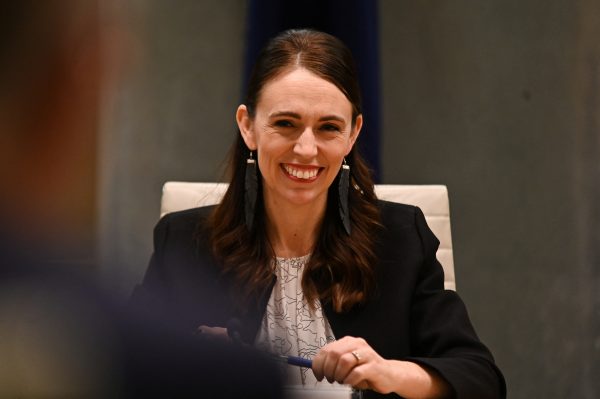The Prime Minister has history at the UN, first making waves in 2018 by bringing her baby, Neve, into the UN General Assembly Hall. Other milestones on Ardern’s path to international popularity included her leadership following the Christchurch mosque attack, the initial success of her administration’s COVID-19 elimination strategy and her rhetorical framing of the climate crisis as her generation’s ‘nuclear-free moment’.
But a stellar international reputation does not guarantee the same sorts of plaudits back home. The August 2022 TVNZ/Kantor Public poll gave the opposition National Party a four point lead over Ardern’s Labour. While other polls released during the same period were a little closer — Horizon Research had National and Labour neck and neck, while Talbot Mills gave National a single point lead — it is clear that Ardern no longer commands the political heights the way she did a year ago.
Absent Labour’s spectacular performance at the 2020 general election, when for the first time since 1951 a party secured a majority rather than a plurality of the popular vote, these polls can be expected at this point in the political cycle. But Labour’s performance three years ago, when Ardern’s competence stood in stark contrast to the shambles of Judith Collins’ leadership of the National Party, set a high bar. Any fall from this standard was always going to be accompanied by the narrative that Ardern’s domestic star is on the wane.
Since New Zealand has a proportional representation electoral system for parliamentary contests, the real focus in conversations about government formation needs to be on parties other than Labour and National. The two major parties make up most of the electoral running. But since the first mixed member proportionate representation (MPP) election in 1996, with the sole exception of Labour’s 2020 victory, they have needed one or more ‘minor’ parties to get over the line.
For this reason, it is important to analyse the respective polling of the centre-left (Labour, the Greens and Te Pāti Māori or the Māori Party) and centre-right (National, ACT) blocs. Te Pāti Māori, which several recent polls suggest will be pivotal to the formation of the next government, merits particular attention. Te Pāti Māori has positioned itself as part of the centre-left bloc because its co-leaders, Debbie Ngarewa-Packer and Rawiri Waititi, have ruled out any governing arrangement with the libertarian ACT party, whose views on race relations they take serious issue with.
The second reason pundits will be focusing on Ngarewa-Packer and Waititi’s party come 2023 is because the party’s future is likely to hinge on whether or not the latter retains his electorate seat of Waiariki. Under MMP, parties are entitled to list seats in the House if they secure 5 per cent or more of the party vote, so if neither major party secures an outright majority, the ‘coat-tailing’ rule will be critical to government formation.
The issue for National is that none of the latest polls put it in office without ACT. The challenge for those parties’ respective leaders, Christopher Luxon and David Seymour, will be to keep their combined vote share up around the 47 or 48 per cent required to form a coalition majority government. ACT leader Seymour raised the stakes by making a referendum on the Treaty of Waitangi — one of the cornerstones of New Zealand’s constitutional arrangements — a ‘bottom line’ for his party.
All of that aside, Prime Minister Ardern is facing headwinds — which have just become stronger following the results of local authority elections in which centre-right candidates performed strongly. Her administration confronts multiple challenges, including the spiralling cost of living, entrenched income and wealth inequalities, housing unaffordability and an attempt to reform water infrastructure that is proving both divisive and difficult. Policy U-turns (such as rowing back GST levies on KiwiSaver fees) and problems getting major reforms over the line (including to the vocational education sector) have not helped.
Ardern also faces a rejuvenated National Party which, following the selection of Luxon as its fifth leader in four years, has found a focus and discipline it had misplaced. Luxon has his own challenges — not least the lingering questions concerning a recently completed investigation into allegations of bullying and his party’s poor record on selecting women and Māori candidates — but his party is now behaving as a functional, organised opposition party should.
As a small nation, New Zealanders generally like to see their own doing well abroad, in politics no less than in sport. But they also like to see them focusing on domestic issues when things get tough. While Ardern’s international standing may have been a factor in her success in 2020, as the domestic challenges pile up her status abroad is becoming less salient.
All the same, it wouldn’t pay to write her or her government off just yet. The same polls that have National edging in front also have Ardern comfortably ahead as the preferred prime minister. Finance Minister Grant Robertson has one more Budget to deliver before the next election and the Reserve Bank anticipates some easing of inflation in 2023.
The Prime Minister remains her party’s biggest electoral asset, and if Ardern can line the political ducks up, her appeal at home could once again match her status abroad.
Richard Shaw is Professor of Politics at Massey University of New Zealand.

